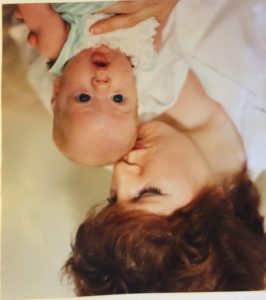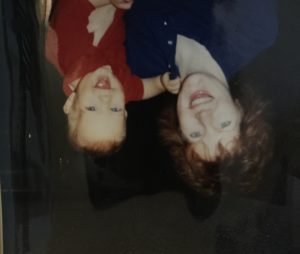 I wrote the words below for a 2002 Mother’s Day column in the Arizona Republic newspaper. Of any job I’ve ever held, that of “mom” has always come first. To this day the column is it still one of my favorites.
I wrote the words below for a 2002 Mother’s Day column in the Arizona Republic newspaper. Of any job I’ve ever held, that of “mom” has always come first. To this day the column is it still one of my favorites.
One stressed-out day a friend gave me the words I didn’t believe, but needed to hear most: “You’re a good mother.”
You see, until you’re a mother, you don’t realize that some days you get a lot more “I hate you’s” than “I love you’s” from your children. Sometimes it’s more than words that are flung across the room in anger and frustration. A counselor once advised me the worst behavior is sometimes directed at ‘Mom’ because that’s who the child feels ‘safe’ with. Thus, in a contorted sense, since the child is confident of love and not being abandoned, it is safer to act out with mom.
My self-doubt as a mother started the day I brought home my first-born from the hospital. Why, I wondered, had the hospital encouraged my husband and I to attend ‘birthing’ classes and taught us so little about how to care for this child? Somehow the hospital assumed the doctor’s office would instruct us, the doctor’s office only answered questions I didn’t feel too silly to ask, and unless you’ve been there, you can’t appreciate how sleep deprivation changes a personality.
This may sound strange, but in an odd sense I remember wanting to go back to work, so I could feel competent at something, because I had never felt so incompetent in my life as when I was a new mother. And, I had never realized how many strangers feel they can judge your ability as a parent.
 Of course my early challenges as a mom are minor compared to others. Even in families where expectations are clear and the family is stable, dangerous icebergs can lurk below the surface. Consider the frustration of undiagnosed learning disabilities, a hearing problem or emotional disability. What seems like a rude child that tunes you out with a blank stare, could be a very frustrated child that doesn’t want to admit he or she can’t do something, or a child that can’t hear straight or process information in a timely manner. Or worse, consider the family where the child is diagnosed with a chronic or life-threatening medical condition.
Of course my early challenges as a mom are minor compared to others. Even in families where expectations are clear and the family is stable, dangerous icebergs can lurk below the surface. Consider the frustration of undiagnosed learning disabilities, a hearing problem or emotional disability. What seems like a rude child that tunes you out with a blank stare, could be a very frustrated child that doesn’t want to admit he or she can’t do something, or a child that can’t hear straight or process information in a timely manner. Or worse, consider the family where the child is diagnosed with a chronic or life-threatening medical condition.
There is no stronger advocate for a child than the mother. Unfortunately, advocacy skills aren’t inherent and are usually learned the old-fashioned way – because you have to. Just ask any schoolteacher who’s dealt with a mother who feels their child has been slighted, ignored, mistreated or failed by a school. To paraphrase Colley Cibber, an early British playwright, hell hath no fury like an angry mother.
Yet, from life’s biggest challenges often come life’s biggest rewards. How empty my life would be without a refrigerator covered in school papers and juvenile artwork. I treasure the memories of rocking a baby to sleep, seeing that first smile, or the toddler that leaps into your arms because ‘Mom’s home.’ Through my children and family, I am reminded daily that my life has value, that I am important, and that one person can make a difference in another life.
Motherhood is the one job that comes with no instruction manual, lasts for a lifetime, and is largely a daily step of faith. Becoming a parent offers no guarantees of an easy life. On the contrary, parenting is a guarantee of new challenges and high stakes, and a job whose results may not be known for years to come.
Thus, my gift to those mothers who suffer from self-doubt like I have, who wonder if they’re really doing a good job, who keep trying even when those efforts are rebuffed, I offer the following:
You’re a good mother.

1 Comment. Leave new
For mothers to doubt about the ability to successfully oversee the child’s growing up process & feel responsible for his/her ability to succeed in life is natural. Smartly, most mothers dream that their children will become healthy, happy, smart & successful at whatever they do. Realistically, mothers’ dreams for their children might not realize due to many unforeseen circumstances. As a result the mothers might hang onto unrealistic dreams, including dreams that they themselves did not achieve thus imposing their own dreams on the children.
Times, human nature, circumstances are on a continuum and influence the child and the mother’s ability to attain their dreams. If the dreams are not attained, there is realistic or not so realistic hope for the achievement someday. HOPE is always there & what would the world be without it?
Therefore, 99 % realistically, the next title of your book ought to be Reality Invites Hope.
Lucy Spychalski